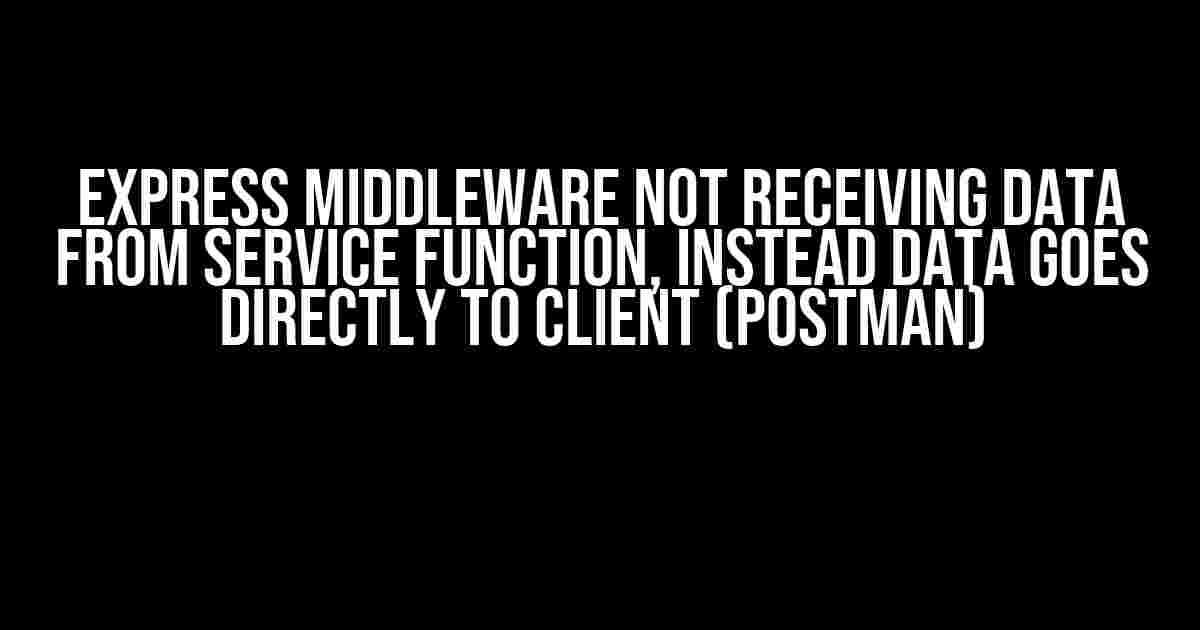Have you ever encountered a situation where your Express middleware is not receiving data from a service function, and instead, the data is being sent directly to the client (Postman)? If so, you’re not alone! This common issue can be frustrating, especially when you’re trying to implement a crucial functionality in your application. Worry not, dear developer, for we’ve got you covered. In this article, we’ll delve into the world of Express middleware, service functions, and Postman to uncover the reasons behind this phenomenon and provide you with step-by-step solutions to troubleshoot and resolve the issue.
Understanding the Basics
Before we dive into the meat of the issue, let’s quickly review the basics of Express middleware, service functions, and Postman.
Express Middleware
In Express, middleware functions are functions that have access to the entire request object (req), the entire response object (res), and the next middleware function in the application’s request-response cycle. Middleware functions can execute any code, make changes to the request and response objects, and even end the request-response cycle. Middleware functions are typically used to perform tasks such as authentication, logging, and input validation.
app.use((req, res, next) => {
console.log('Middleware function executed');
next();
});
Service Functions
A service function, in the context of Express, is a function that performs a specific task or set of tasks. Service functions can be used to encapsulate business logic, interact with databases, or make API calls. They can be called from middleware functions or routes to execute specific tasks.
const userService = {
getUserData: async () => {
// Make API call or database query to retrieve user data
return userData;
}
};
Postman
Postman is a popular API testing tool that allows developers to send HTTP requests to APIs and inspect the responses. Postman can be used to test API endpoints, validate responses, and troubleshoot issues.
The Problem
Now that we’ve covered the basics, let’s discuss the problem at hand. Imagine you have a middleware function that calls a service function to retrieve some data. However, instead of the middleware function receiving the data, the data is being sent directly to the client (Postman).
app.use((req, res, next) => {
userService.getUserData().then((userData) => {
//Middleware function is not receiving userData
console.log(userData); // undefined
res.send(userData); // userData is sent directly to Postman
});
});
This behavior can be confusing, especially if you’re expecting the middleware function to receive the data and perform some additional processing or validation.
Causes of the Issue
There are several reasons why your middleware function might not be receiving data from the service function. Let’s explore some common causes:
- Asynchronous function execution: Service functions might be asynchronous, which means they return promises rather than actual data. If you’re not handling the promise correctly, the data might be sent directly to the client.
- Incorrect middleware function implementation: Middleware functions can be tricky to implement correctly. If your middleware function is not implemented correctly, it might not receive the data from the service function.
- Misconfigured Express app: Sometimes, issues with the Express app configuration can cause middleware functions to malfunction.
Solutions to the Issue
Now that we’ve identified the potential causes, let’s explore some solutions to the issue:
Solution 1: Handle Asynchronous Functions Correctly
When dealing with asynchronous service functions, it’s essential to handle the promise correctly. You can use async/await syntax or .then() method to handle the promise.
app.use(async (req, res, next) => {
try {
const userData = await userService.getUserData();
console.log(userData); // userData is received correctly
res.send(userData);
} catch (err) {
console.error(err);
}
});
Solution 2: Implement Middleware Function Correctly
Ensure that your middleware function is implemented correctly. Make sure to call the next() function to pass control to the next middleware function or route.
app.use((req, res, next) => {
userService.getUserData().then((userData) => {
console.log(userData); // userData is received correctly
res.locals.userData = userData;
next();
});
});
Solution 3: Configure Express App Correctly
Verify that your Express app is configured correctly. Make sure to use the correct order for middleware functions and routes.
const express = require('express');
const app = express();
app.use(bodyParser.json());
app.use('/api', apiRouter);
app.listen(3000, () => {
console.log('Server listening on port 3000');
});
Best Practices
To avoid similar issues in the future, follow these best practices:
- Use async/await syntax or .then() method to handle promises: This ensures that you’re handling asynchronous functions correctly and receiving data as expected.
- Implement middleware functions correctly: Ensure that your middleware functions are implemented correctly, and you’re calling the next() function to pass control to the next middleware function or route.
- Use Postman to debug API endpoints: Use Postman to test API endpoints and inspect responses. This helps you identify issues early on and troubleshoot problems more efficiently.
- Verify Express app configuration: Make sure to verify your Express app configuration to avoid misconfiguration issues.
Conclusion
In this article, we’ve explored the issue of Express middleware not receiving data from service functions, instead sending data directly to the client (Postman). We’ve identified common causes, including asynchronous function execution, incorrect middleware function implementation, and misconfigured Express app configuration. We’ve also provided solutions to each of these causes, including handling asynchronous functions correctly, implementing middleware functions correctly, and configuring the Express app correctly. By following best practices and being mindful of these potential issues, you’ll be better equipped to troubleshoot and resolve similar problems in the future.
| Cause | Solution |
|---|---|
| Asynchronous function execution | Handle promises correctly using async/await syntax or .then() method |
| Incorrect middleware function implementation | Implement middleware functions correctly, calling the next() function |
| Misconfigured Express app | Verify Express app configuration, ensuring correct order of middleware functions and routes |
Additional Resources
If you’re interested in learning more about Express middleware, service functions, and Postman, here are some additional resources:
- Express Middleware Documentation
- Postman Tutorial: Asynchronous APIs
- FreeCodeCamp: APIs and Microservices
By following the solutions and best practices outlined in this article, you’ll be well on your way to resolving the issue of Express middleware not receiving data from service functions, and ensuring that your application functions as expected.
Here are 5 Questions and Answers about “Express middleware not receiving data from service function, instead data goes directly to client (Postman)” :
Frequently Asked Question
Stuck with Express middleware? We’ve got you covered! Check out these FAQs to get your middleware working smoothly.
Why is my Express middleware not receiving data from the service function?
This might happen if your service function is not properly returning the data to the middleware. Make sure your service function is using a callback or returning a promise that resolves with the data. Also, check if you’re using `next()` correctly in your middleware to pass control to the next function in the stack.
How do I ensure that my middleware receives data from the service function?
To ensure that your middleware receives data from the service function, use a callback function as an argument in your service function. Call this callback function with the data as an argument when the service function is complete. In your middleware, call the service function and pass a callback function that handles the received data.
Why is data going directly to the client (Postman) instead of passing through my middleware?
This might occur if you’re not using the `return` statement when calling the `next()` function in your middleware. When you don’t use `return`, the execution continues to the next function in the stack, which might be the route handler that sends the response directly to the client. Always use `return next()` to ensure that the control is passed correctly.
How do I debug my Express middleware to identify the issue?
To debug your Express middleware, use console logging or a debugger to track the flow of execution and inspect variables. You can also use a logging library like Morgan to log requests and responses. Additionally, use tools like Postman or cURL to test your API and inspect the responses.
What are some common mistakes to avoid when using Express middleware?
Common mistakes to avoid include not using `return next()` correctly, not handling errors properly, and not using middleware in the correct order. Also, be mindful of asynchronous operations and ensure that you’re handling them correctly using callbacks, promises, or async/await.
I hope these FAQs help you troubleshoot and resolve issues with your Express middleware!


